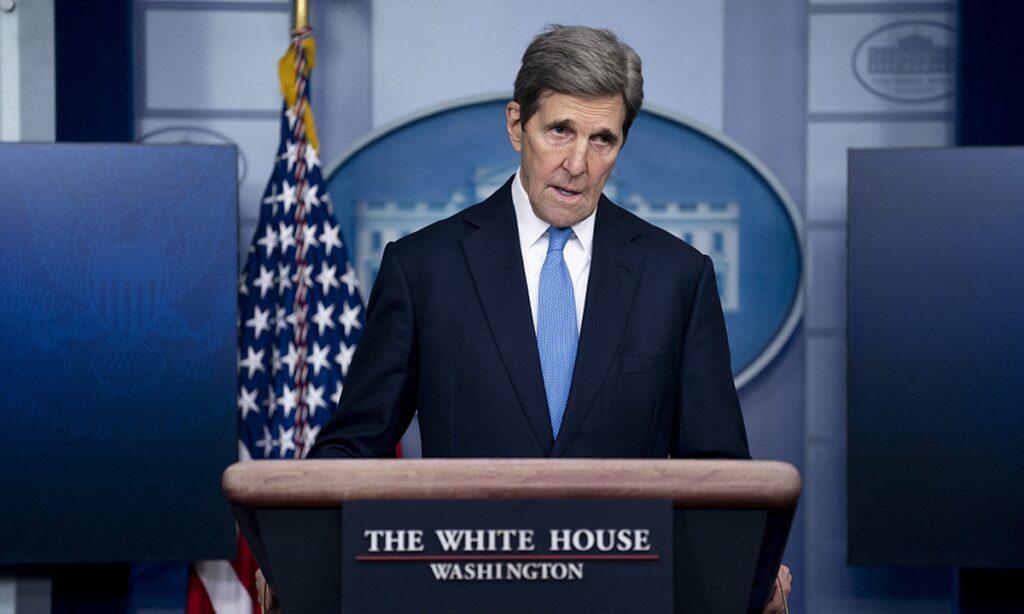By inviting US climate envoy John Kerry to Shanghai to discuss climate issues, China has demonstrated its ambition in global climate governance, and also sent a signal to the US that climate negotiations between the two are on equal terms, and that China is not and won’t be the “attendant” of US-centered climate campaign, Chinese observers commented on Wednesday.
Both China and the US confirmed on Wednesday that Kerry would meet his Chinese counterpart Xie Zhenhua in Shanghai from Wednesday to Saturday, ahead of US President Joe Biden’s virtual summit with world leaders on climate change next week.
At China’s invitation, Kerry’s visit to Shanghai will allow the two sides to exchange views on climate change cooperation, the 26th session of the Conference of the Parties of the UN Framework Convention on Climate Change and other issues, Chinese Ministry of Ecology and Environment said in an official statement on Wednesday.
By sending an olive branch to Washington on climate cooperation talks, Beijing has demonstrated its ambition to lead global climate change issues, and also sent a signal to the US that cooperation in this field will be based on equal terms, Li Haidong, a professor at the Institute of International Relations of the China Foreign Affairs University, told the Global Times on Wednesday, noting that “China is not an attendant of the US climate change campaign.”
Kerry has already visited multiple countries in his capacity as Biden’s envoy for climate matters. In March, he met with European officials in London, Brussels and Paris. This month, he visited the United Arab Emirates, India and Bangladesh. He will also head to Seoul after his Shanghai visit.
Seoul’s appearance on Kerry’s agenda is simply because it has been active in cooperating with other countries in the fight against climate change, said experts.
Biden has invited 17 countries responsible for about 80 percent of global emissions to next week’s summit, according to the White House, noting it would push those countries toward greater commitments to lowering emissions.
Chinese observers called Washington’s move as “trying to form a US-centered climate cooperation circle” in order to shore up its leadership on global issues. However, China has now shouldered the responsibility of global climate governance, as the US’ frequent departure and then return to global cooperation on this issue has marred global cooperation and diminished other countries efforts, said Li.
Before his departure for Shanghai, Kerry told The Wall Street Journal on Tuesday that his team is committed to finding ways to force China to be accountable for pledges it makes in continuing negotiations to reduce greenhouse gas emissions that contribute to climate change.
Last week, during a diplomatic trip to India, Kerry told reporters he was “hopeful [but] not confident at this point” about Chinese cooperation.
As a matter of fact, the US is the saboteur of climate issues as its withdrawal from The Paris Agreement has dealt a heavy blow to global climate cooperation and governance on climate issues, Ma Jun, director of the Beijing-based Institute of Public and Environmental Affairs, told the Global Times on Wednesday.
He noted that the opportunity for the two countries to cooperate has turned ripe, as China announced ambitious targets of becoming carbon neutral by 2060 while the US is working out a plan to decarbonize itself in 30 years..
The success of Biden’s climate summit, as well as international cooperation to reduce carbon emissions, cannot be achieved without the cooperation and consensus of China and the US, said Ma, suggesting the US put aside its prejudice first and work on establishing mutual trust with China in this field.
Kerry is the first senior official from the Biden administration to visit China. The visit comes as the two countries are locked in clashes over trade, human rights and the Taiwan question, and is viewed by some observers as an ice-thawing signal.
Yet Chinese observers doubted this cooperation will drive bilateral ties out of their plight and lead to collaboration in other fields, as the visit will solely focus on climate issues.
Li also said that considering the current US political atmosphere, cooperation on climate change will be hard to change bilateral relations. “Yet a face-to-face negotiation on pragmatic issues is better than no contact at all. If anything positive comes out of Kerry’s visit, it will still be critical to China-US relations,” he noted.
“The climate issue is a free-standing issue. It’s not for trade against the other critical differences that we have with China right now,” Kerry told the Wall Street Journal.
Kerry’s visit to China and South Korea also comes at a sensitive time when Japan’s decision to dump radioactive water from the Fukushima nuclear plant into the ocean angered Beijing and Seoul. The US indulgence of Japan’s decision also invited itself waves of condemnation from Japan’s two neighbors.
“The radioactive water dumping incident will overshadow Kerry’s visit to those two Asian countries. US indulgence on Japan showed the selfish intentions of Washington’s Asia-Pacific policy, which is to put its narrow-minded strategic interests above the interests of the people from the region and even global human health and safety,” Li Haidong said.
Li noted that the US must show sincerity not to let Washington’s narrow-mindedness and hypocritical geopolitical competition mentality override cooperation on climate and environment issues; otherwise, it will be hard to form a concrete climate cooperation campaign with China and South Korea.
John Kerry Photo:VCG


